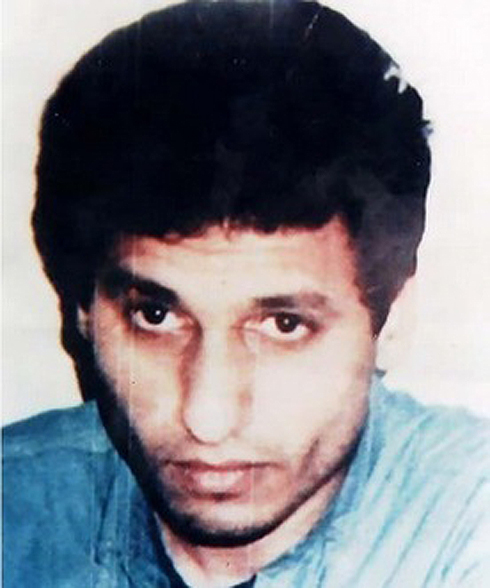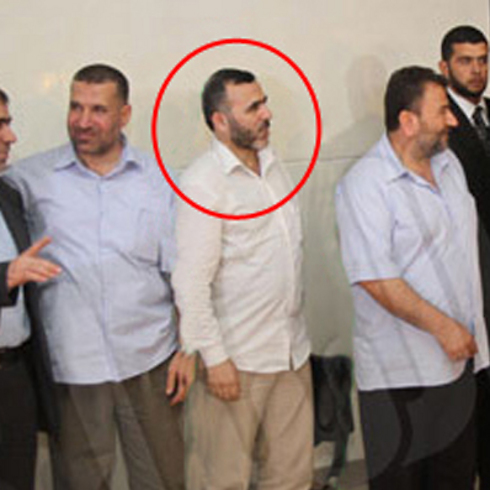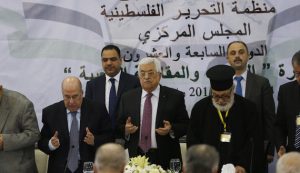An end to the charade called PA
Palestinian President Mahmoud Abbas (C) prays at the start of a meeting for the PLO’s Central Council, in the West Bank city of Ramallah, March 4, 2015. Photo by Mohamad Torokman / Reuters
Palestinian focus on isolating Israel, continuing ICC efforts
With Palestine joining the International Criminal Court and suspending the security co-operation with Israel, Palestinians hope to isolate the Israeli state internationally and make it pay for its occupation and war crimes.
By Daoud Kuttab, Al Monitor / Palestine Pulse
March 19, 2015
Weeks before the results of the Israeli elections were known, the Palestine Central Council (PCC) met in Ramallah to decide on the Palestinian strategy. Somehow anticipating a continuation or a shift to the hard right, the council resolved on March 5 to give Palestinian President Mahmoud Abbas the mandate to suspend security co-operation and to move ahead with the ongoing efforts at the International Criminal Court (ICC).
The United Nations declared that the nonmember state of Palestine will become a full legal member in the ICC on April 1. Palestine will reportedly sue Israel for war crimes in the Gaza Strip, as well as the perpetual war crimes in terms of the illegal settlements in the occupied territories.
The move toward a proactive strategy comes after years of futile negotiations with an Israeli protagonist that talks about peace, but acts with tanks and bulldozers. Now that Israeli Prime Minister Benjamin Netanyahu’s anti-peace and racist ideology has become public, the rest of the world has seen what Palestinians have known for decades: that the Israelis are not serious about peace.
Despite this prophetic knowledge, however, Palestinian options are limited. Short of a violent uprising, which in the past has brought disastrous results, the Palestinians’ main option is to help further isolate Israel internationally and to make its occupation costly.
To further isolate Israel, the Palestinians will be pushing hard to show the world that the so-called only democracy in the Middle East is in reality implementing an apartheid regime against 4 million Palestinians. Palestinians living under Israeli military control are disenfranchised and are denied their basic political rights. If the idea of a Palestinian state is no longer on the books, as per the statement of Netanyahu on the eve of the elections on March 16, this automatically means that the majority of Palestinians in Palestine are being ruled by the Israeli minority.
The crime of apartheid is extremely important because it carries international legal weight. When the apartheid crime became part of international humanitarian law, it provided the world with a legal mechanism to sanction Israel. If Palestinians can succeed in assigning the term apartheid to Israel’s rule in the occupied territories, the world’s leading powers will have the legal instrument to escalate economic sanctions against the government in Tel Aviv.
While much of the effort to isolate Israel will need to be done internationally, Palestinians themselves have the option to make Israel’s occupation much more costly. Ever since the Palestinian Authority (PA) was established in May 1994 through the Oslo Accord, Israel was practically relieved from the financial and administrative burden — not to mention the security nightmare — of directly ruling a large hostile population. The Oslo Accord was a perfect mechanism for Israel to be relieved of security obligations in the Palestinian-populated cities in Area A (under full PA control), while also being relieved from administrative and financial responsibilities for an even larger swath of land in Area A and Area B (under Palestinian civil control but joint Israeli-Palestinian security control).
A believer is not stung from the same hole twice
Palestinian leaders, who accepted this unfair and unjust classification of Palestinian lands, were able to justify their decision by saying that this was a transitional plan. But what was a five-year transitional plan that was supposed to end in 1999 has now become a 20-year-old nightmare that only benefits Israel while sapping the Palestinians.
The PCC’s decision to suspend security co-operation is a devastating blow for Israel. Without security co-operation, the Israelis will be forced to return to man the old city of Nablus and downtown Ramallah, Jenin and Bethlehem — an act that will put an end to the charade called PA, Palestinian police or the grandiose government of the state of Palestine. Palestinians think the suspension of security coordination, rather than the unilateral dissolving of the PA, will force Israel to pay a price for its occupation.
Isolating Israel internationally and forcing it to retake the job of the PA will not be easy on the Palestinians, nor will Israel accept it without a fight. After Netanyahu cobbles together his third coalition government in a row, it will not be surprising if we see a concerted charm offensive. The pre-election statement will be finessed as part of the electoral campaign and Israel will say clearly and repeatedly that indeed it wants peace with its Palestinian neighbor. The Palestinian tax money will be returned and Gaza’s siege will be eased.
Palestinians would be foolish to fall for that again. A well-known Arab proverb says, “A believer is not stung from the same hole twice.” It would be tragic if after a populist Israeli leader publicly utters that when elected his government will not support a Palestinian state to engage again with such a deceitful politician.
The best Palestinian strategy is no longer a defensive reactionary one. Palestinians need to go on the offence and be proactive in using non-violent means, both at home and abroad. For such a strategy, which will be costly to the Palestinian people, the leadership needs to prepare the public and be united in its goals and tactics. Before launching such an effort, the No. 1 priority requires that Palestinian unity be ensured of goal and purpose in order to launch what will require a lot of sacrifices to reach the goal of freedom and independence.
The deepening rift between Fatah and Hamas
Hamas-Fatah relations are further deteriorating as the two movements uphold their storm of mutual accusations, halting any foreseeable prospects of unity.
By Ahmad Melhemm trans. Joelle El-Khoury, Al Monitor / Palestine Pulse
March 20, 2015
RAMALLAH — Fatah-Hamas ties slid down a slippery slope late last week following mutual accusations of treason. This has weighed down the ties between the two movements, as well as the timid efforts to implement the stalled reconciliation deal signed in April 2014. Islamic Jihad and leftist factions attempted to prevent the collapse of reconciliation prospects.
To this effect, the PLO’s Executive Committee announced March 19 that it will be send a delegation representing all factions to the Gaza Strip to hold an inclusive dialogue with the participation of Hamas and Islamic Jihad. The dialogue will address the implementation of previous agreements, such as preparing for the elections, developing the framework of the PLO and helping the government supervise the Gaza Strip and certain border crossings.

Old photo of Israel’s most wanted man, Mohammed al Deif.
Accusations of treason were on ignited March 13, when Gaza’s Interior Ministry released recordings attributed to Ramallah’s security services. The ministry claimed that the security forces were responsible for “the destabilization of Gaza, the spread of chaos and the surveillance and armament of military wings in Gaza.” Meanwhile, Hamas leader Mahmoud al-Zahar accused President Mahmoud Abbas of “personally being involved in the destabilization of Gaza.”
Fatah spokesman Ahmad Assaf said that the objective of Hamas’ accusations is “to justify the separation of the Gaza Strip [from the West Bank], and to cover up the involvement of some of its leaders in spying and security cooperation with Israel.”
The mutual accusations have escalated the dispute between the two movements — a dispute that is concretely reflected in the administrative separation of the Gaza Strip from the West Bank. The separation began on June 7, 2007, when Hamas and Fatah-affiliated security forces clashed in the Gaza Strip, essentially a civil war lasting just a few days. Hamas then took over Gaza’s security and political institutions, prompting Abbas to declare a state of emergency in the Palestinian territories.
Assaf told Al-Monitor that Hamas accusing Fatah of collaborating with Israel proves that Hamas “does not want reconciliation,” and has only a single plan: “the separation of Gaza from the West Bank and the establishment of its [Hamas’] chiefdom in Gaza.” Hamas’ accusations, said Assaf, are designed “to complete the separation of the Gaza Strip from the West Bank, to cover up the treason at the top of Hamas’ pyramid [that is] taking place in Gaza under the pretext of so-called collaboration [with Israel].”

The rarely seen Marwan Issa, said to be top commander of the Izz ad-Din al-Qassam Brigades. Archive photo from Ynet, 2015.
Assaf said that the treason of Hamas’ leaders is evidenced by Israel’s knowledge of the whereabouts of Mohammed al-Deif, commander of the Izz ad-Din al-Qassam Brigades, during the recent war. Knowledge of top leaders’ locations is usually confined to the narrow circle of Hamas’ leadership, yet Israel was also able to identify the whereabouts of Said al-Sayyam in 2009 and Mahmoud al-Mabhouh in Dubai in 2010, leading to the figures’ assassinations.
“He who wants reconciliation does not speak this way,” said Assaf, “but implements what was agreed upon, and consults with the people by holding comprehensive elections.” Assaf ruled out the possibility that the two movements will hold meetings in the near future, and said, “The Hamas movement is farthest from reconciliation.”
Last April 23, Fatah and Hamas signed a reconciliation deal — known as the Beach refugee camp agreement — under the auspices of PLO factions in the Gaza Strip. The agreement stipulated the formation of a consensus government that would pave the way for elections.
The consensus government was sworn in last June 2, yet it has failed to conduct the task of preparing for presidential and legislative elections, as required. As detailed in the agreement, the government’s main duty was to prepare for elections, since the Legislative Council is disabled and no longer has any powers. Furthermore, the institutions of the West Bank and the Gaza Strip were to be unified under the supervision of a government based on popular support.
Fatah and Hamas have also failed to implement other clauses in the reconciliation deal, including “community reconciliation, developing the PLO, holding elections and resuming the work of the Legislative Council.”
Hamas leader Yahya Moussa told Al-Monitor in a phone interview, “The implementation of the reconciliation deal’s clauses depends on President Abbas’ political will and decision, because he doesn’t want the consensus government to assume its task and does not want to implement the reconciliation deal’s clauses.”
Moussa rejected the accusations leveled against his movement, saying: “Should we have wanted a state to be established in Gaza, it would have been an easy thing to do. Yet Gaza and Hamas are paying the price for rejecting the separation of Jerusalem and the West Bank from the Gaza Strip.”
Moussa expressed Hamas’ wish for national factions to control the implementation of the reconciliation deal. He added that Hamas has opted for “national unity.” Hamas is also eager for the “consensus government to assume its responsibility and tasks, the partnership and the inevitable work to restore the West Bank, in which Israel has increased ambitions.”
Regarding the Interior Ministry news conference, Moussa said it “disclosed the facts. These facts are not part of a media dispute or a threat to the reconciliation. It is the existing reality and President Abbas has not denied it when he said that ‘security coordination is sacred.’”
A delegation of PLO factions was supposed to visit Gaza in early February to discuss the implementation of the reconciliation deal and the enablement of a consensus government in Gaza. Yet, PLO Executive Committee member Wasel Abu Yousef told Al-Monitor: “The mutual accusations between the two parties will have an impact on the reconciliation. Yet the bet on the national project that includes all factions still holds.”
Abu Yousef added that Hamas’ accusations have aggravated the situation, at a time when one must be keen to unite the ranks to achieve national unity and to give the consensus government a chance to extend its sovereignty over Gaza and the border crossings. Abu Yousef said that the two parties must agree to halt the bickering that is blocking reconciliation.
Qais Abdul Karim, deputy secretary-general of the Democratic Front for the Liberation of Palestine, said the recent bickering between Fatah and Hamas has turned the clock back in terms reconciliation.
Abdul Karim said that the Executive Committee will discuss the PLO delegation’s visit to Gaza in an attempt to halt the dispute between the two movements. “This requires a clear atmosphere to resume efforts for a successful dialogue,” said Karim.
Ahmad Jamil Azem, a university lecturer and political analyst, told Al-Monitor that reconciliation, from the beginning, was nearly impossible, given the presence of parties within the movements — as well as international parties — that oppose reconciliation.
“All factors are not now serving the reconciliation, because the parties are not suggesting a new strategic vision for the current phase, and there is no national reference following up on what is going on,” he said.
Azem said that the situation between the two movements might deteriorate: “Both parties have many plans that are not based on the reconciliation, but rather on the resolution of the conflict and their disputes.”
After seven years of division, the two movements continue to exchange mutual accusations from time to time, throwing reconciliation into an open-ended vicious circle, despite the persistent internal problems and popular discontent.

